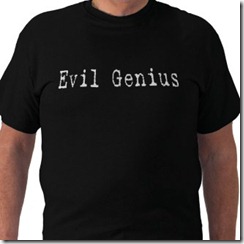Fiction-Zone: Leaps in Fiction Mastery by Diane Holmes, Chief Alchemist of Pitch University
In my other life, the one where I wear my “evil genius” costume and am secretly a billionaire, I help writers with their verbal pitches.
It’s rather addictive.
Today, I share 5 secrets that I usually guard with my life. No, wait. Make that your life. (Cue evil laugh.)
1. Tell us how to listen to your pitch.
Assume we’re expecting to hear a pitch for something that is not remotely like your book. Perhaps we expect an a story about an alien love-child’s secret trip to corporate America where she falls in love with a janitor? Yes, why not.
Now, correct our expectation. This is your opening.
Examples:
- This is a young adult, fantasy romance about a 16-year-old high-school student who falls for an exchange student from the North Pole.
- This is a literary mystery about two murders that happen 300 years apart but are unfolding in parallel timelines.
- This is a non-fiction book about the inconsistencies in courtroom testimony and how to correct that during a trial.
2. Talk about people.
Most books involve people or characters (fake people) doing things.
Coincidentally, that is how readers think about books, too.
So even if you start out with an epic situation, setting, or high concept, tell us about the most central players and their initial actions (the big thing that really gets the plot going).
Examples:
* This book is about the Gold Rush. When Mira’s husband dies, she takes her 5 children to California to pan for gold.
* An asteroid is headed to Earth. Arnold is a boy of 7 whose believes he’s an alien, and his missing family will be on that asteroid. He sets out to the projected Ground Zero to make sure they’re able to find him.
* Set across war-torn Europe during World War II, Jim searches for his younger, disabled sister, who is missing after their town is bombed.
3. Tell us only the stuff that makes up important scenes.
We listeners think everything you tell us equals “a whole lotta important scenes.”
- Sean, a comic book writer… (Oh, good, there will be lots of scenes where Sean is drafting a new comic book!)
- Terry, an Admiral in the Navy… (Yes! This is a story set in the world of the Navy, and we’ll get to see Terry fulfilling the role of Admiral!)
- Jauny, the wife of a serial killer… (Cool! This will be a story about a woman who is married to a serial killer… and that life.)
Imagine our confusion when we find out that…
- Sean is on vacation in Costa Rica and never references writing comic books.
- Terry’s story is about his ancestral home which is haunted, and the whole story is set there, not on the High Seas.
- Jauny left her husband before he was caught 10years ago, and now she’s a chef on a cruise line, who wants to sing.
4. Take out every generic description and cliché.
Tempted to say things like “she must learn to trust again,” or “he’s handsome and sexy”?
Don’t.
This tells us nothing about how your book is special. Instead it tells us that your book is like all the others. Pass.
Example:
Instead of this: “A jaded cop doggedly pursues a serial killer before he kills again.”
Tell us only what makes your story unique: “Tom Mallory, A rookie patrol officer, gets involved with a homicide detective obsessed with the work of a famous serial killer—a killer who might be her twin brother.”
5. Don’t tell us the end.
In most cases, it will only sound underwhelming.
And disjointed.
And a big, fat let down.
(Or so obvious we roll our eyes.)
Examples:
- And they do find gold after an earthquake and a stampede.
- But the asteroid misses Earth.
- He looks for a long time and finally finds her. She’s okay.
BONUS
And notice, nowhere did I tell you the number of words your pitch needs to be or any other silly rule.
Also, no formulas to fill in.
And certainly no threats that you’ll fail if you don’t follow everything I said in this column.
You don’t have to be perfect. Just be the best and most interesting you can be today.
—
 Diane writes two alternating columns for Freelance-Zone:Fiction-Zone: Leaps in FictionMastery and Marketing-Zone:Marketing-Zone: Marketing Yourself and Your Book.
Diane writes two alternating columns for Freelance-Zone:Fiction-Zone: Leaps in FictionMastery and Marketing-Zone:Marketing-Zone: Marketing Yourself and Your Book.





